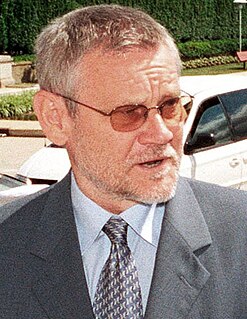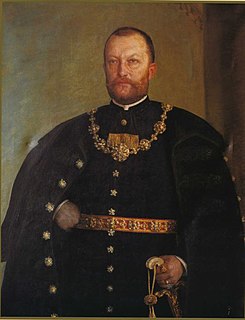The politics of Croatia are defined by a parliamentary, representative democratic republic framework, where the Prime Minister of Croatia is the head of government in a multi-party system. Executive power is exercised by the Government and the President of Croatia. Legislative power is vested in the Croatian Parliament. The Judiciary is independent of the executive and the legislature. The parliament adopted the current Constitution of Croatia on 22 December 1990 and decided to declare independence from Yugoslavia on 25 May 1991. The Constitutional Decision on the Sovereignty and Independence of the Republic of Croatia came into effect on 8 October 1991. The constitution has since been amended several times. The first modern parties in the country developed in the middle of the 19th century, and their agenda and appeal changed, reflecting major social changes, such as the breakup of Austria-Hungary, the Kingdom of Serbs, Croats and Slovenes, dictatorship and social upheavals in the kingdom, World War II, the establishment of Communist rule and the breakup of the SFR Yugoslavia.

The President of Croatia, officially styled the President of the Republic, is the head of state, commander in-chief of the military and chief representative of the Republic of Croatia both within the country and abroad. The President is the holder of the highest office within the Croatia's order of precedence, however, the president is not the head of the executive branch as Croatia has a parliamentary system in which the holder of the post of Prime Minister is the most powerful person within the country's constitutional framework and within everyday's politics.

Parliamentary elections to elect all 151 members of the Croatian Parliament were held on November 23, 2003. They were the 5th parliamentary elections to take place since the first multi-party elections in 1990. Turnout was 61.7%. The result was a victory for the opposition Croatian Democratic Union party (HDZ) which won a plurality of 66 seats, but fell short of the 76 needed to form a government. HDZ chairman Ivo Sanader was named the 8th Prime Minister of Croatia on 23 December 2003, after parliament passed a confidence motion in his government cabinet, with 88 Members of Parliament voting in favor, 29 against and 14 abstaining. The ruling coalition, consisting of the Social Democratic Party (SDP), Croatian People's Party (HNS), Croatian Peasant Party (HSS), Party of Liberal Democrats (Libra) and the Liberal Party (LS) did not contest the elections as a single bloc. Namely, the SDP ran with the Istrian Democratic Assembly (IDS), the Party of Liberal Democrats (Libra) and the Liberal Party (LS), HNS ran with the Alliance of Primorje-Gorski Kotar (PGS) and the Slavonia-Baranja Croatian Party (SBHS), while HSS ran on its own.

The Croatian Democratic Union is a conservative political party and the main centre-right political party in Croatia. It is one of the two major contemporary political parties in Croatia, along with the centre-left Social Democratic Party (SDP). It is currently the largest party in the Sabor with 55 seats. The HDZ ruled Croatia from 1990 after the country gained independence from Yugoslavia until 2000 and, in coalition with junior partners, from 2003 to 2011, and since 2016. The party is a member of the European People's Party (EPP). HDZ's leader, Andrej Plenković, is the current Prime Minister of Croatia, having taken office following the 2016 Parliamentary Election.

The Croatian Social Liberal Party is a conservative-liberal political party in Croatia. The HSLS was formed in 1989 as the first Croatian political party formed after the reintroduction of multi-party system.
This is the history of Croatia since the end of the Croatian War of Independence.
Regular elections in Croatia are mandated by the Constitution and legislation enacted by Parliament. The presidency, Parliament, county prefects and assemblies, city and town mayors, and city and municipal councils are all elective offices. Since 1990, five presidential elections have been held. During the same period, nine parliamentary elections were also held. In addition, there were six nationwide local elections. Croatia has held two elections to elect 11 members of the European Parliament following its accession to the EU on 1 July 2013.

Jadranka Kosor is a Croatian politician and former journalist who served as the Prime Minister of Croatia from 2009 to 2011, having taken office following the sudden resignation of her predecessor Ivo Sanader. Kosor was the first and so far only woman to become Prime Minister of Croatia since independence.

Dražen Budiša is a retired Croatian politician who used to be leading opposition figure in the 1990s and a two-time presidential candidate. As leader of the Croatian Social Liberal Party through the 1990s he remains to date the only Leader of the Opposition not to have been from either the Croatian Democratic Union or Social Democratic Party.

Parliamentary elections for the Chamber of Representatives of the Croatian Parliament were held on 3 January 2000. These were the first elections to be held after the expiration of a full 4-year term of the previous Chamber of Representatives.

Parliamentary elections were held in Croatia on 25 November 2007 and for overseas voters on 24 and 25 November. The campaign officially started on 3 November. The President of Croatia announced elections on 17 October and 14 days were allowed for candidate lists to be submitted.
Croatian parliamentary elections were held from 19 to 22 May 1897. The People's Party emerged as the victor.

Presidential elections were held in Croatia on 27 December 2009 and 10 January 2010. Twelve candidates participated in the first round, prior to a run-off between first-round winner Ivo Josipović and runner-up Milan Bandić. In the run-off, Josipović won a landslide victory, receiving 60.3% of the vote becoming the first elected president nominated by the Social Democratic Party of Croatia (SDP). The incumbent president Stjepan Mesić, who was first elected in 2000 as the candidate of the Croatian People's Party and re-elected in 2005 as an independent, was ineligible to seek re-election to a third term due to term limits.

Ivo Josipović is a Croatian jurist, composer and politician who served as the President of Croatia from 2010 to 2015.

The Triune Kingdom was a formal Croatian entity within the Austro-Hungarian Empire. It comprised three Croatian realms, Dalmatia, Slavonia, and Croatia proper —which, despite their political and administrative separation, were formally united as a single crown land.

Ivo Goldstein is a Croatian historian, author and ambassador.

Parliamentary elections were held in Croatia on Sunday, 4 December 2011 to elect 151 members to the Croatian Parliament. They were the sixth parliamentary election in Croatia since independence.

Zlatko Hasanbegović is a Croatian historian and politician who has served as a member of the Croatian Parliament since 2016. He served as Minister of Culture in the Cabinet of Tihomir Orešković from 22 January to 19 October 2016. Hasanbegović is also a member of the Zagreb Assembly and one of the founders of the Independents for Croatia party.

Marija Pejčinović Burić is a Croatian politician of the centre-right Croatian Democratic Union party who has been the 14th Minister of Foreign and European Affairs of Croatia and Deputy Prime Minister of Croatia since 19 June 2017. She is the third woman to hold the post of foreign minister, following Kolinda Grabar-Kitarović and Vesna Pusić. Pejčinović Burić previously served as a Member of Parliament during its Sixth Assembly (2008–2011), representing the 6th electoral district.




















